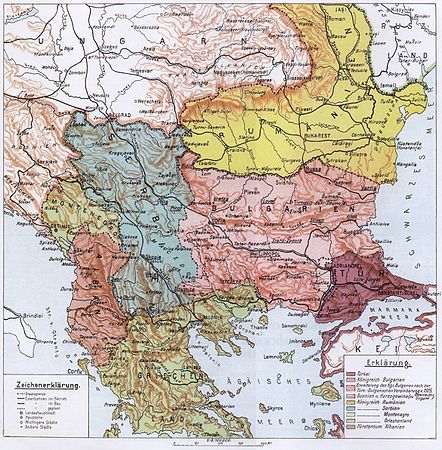Europeana/1914-18/Wikimedians of Bulgaria
The Bulgarian participation in World War I includes the military actions of the Kingdom of Bulgaria during World War I. It encompasses the period from the 14th of October 1915 when the Kingdom of Bulgaria declares war on the Kingdom of Serbia until the 29th of September 1918 when as per the Treaty of Thessaloniki Bulgaria surrenders.
After the war the internal state of the country is terrible. The currency inflation grows constantly. The economy is in decline due to war damage, reparations and requisitions. Understandably, the new rulers of the country are the ones who stood in political opposition – the leftist and the agronomical parties. Bulgaria is occupied by the Entente. On the 27th of November 1919 the Treaty of Neuilly-sur-Seine is signed. The treaty has devastating consequences on the Bulgarian nation and country.
Bulgaria loses more than 115 000 soldiers and officers in the war. In addition, there are thousands of wounded and prisoners of war.
Bulgarian State Archive
[edit]Since March 2012 when the collaboration with the Bulgarian Archive State Agency began, there have been 875 photos and documents related to the First World War that were digitized. There are photos of the battle front which represent the real setting and scene. Part of the documents are caricatures and post cards of propaganda character which find place in the newspapers and the magazines. Some private diaries of military personnel that took part in the war are also of great value. They provide a clear understanding of the military operations that were led at the time. At the State military historic archive in Veliko Tarnovo are kept the diaries of the Staff of the Bulgarian army in which the course of war is reported on a daily basis.
During World War I a large part of the country’s intellectuals and public figures are mobilized: writers, poets, literary critics, musicians, actors, teachers, university professors.
A valuable edition is the album dedicated to the First World War "Album de la Grande Guerre" №10 from 1995. It used to be a gift to the Bulgarian general Nikola Zhekov.
An extremely valuable document is the ratification of the peace treaty between the winning countries in World War I and Bulgaria, signed in Neuilly-sur-Seine on the 27th of November 1919.
Photographers
[edit]-
Christmas, 1915. 1st Sofia Infantry Regiment in the Serbian campaign, World War I. Album presented to "our beloved commander in chief major-general Nikola Zhekov" by the officers of the regiment.
-
1st Sofia Infantry Regiment in the Serbian campaign, World War I. Album presented to "our beloved commander in chief major-general Nikola Zhekov" by the officers of the regiment, 1915.
-
Photo from performance of front-line theater during World War I.
-
Historic military photos. Czech howitzer Škoda 30.5 cm Mörser ready to fire.
-
Bulgarian literary critic Vladimir Vasilev as a participant in World War I.
-
At the Dardanelles. Washing off the Horses. "Album de la Grande Guerre" №10, 1915
-
Prisoners of the Triple Entente during the World War I in Bulgaria.
Maps
[edit]-
Bulgarian–Ottoman convention (1915)
-
Bulgaria during World War I; borders in grey. Ivan Parlapanov, Almanach für das Königreich Bulgarien, Leipzig und Sofia, Max Beck Verlag, 1928
-
Special map of the Romanian theatres.
Documents
[edit]-
Manifesto of Tsar Ferdinand of Bulgaria declaring war on Serbia and entering the First World War.
-
Ratification of the Treaty of Neuilly-sur-Seine.
-
Diary of Iliya Enchev from the First World War. Manuscript. Original. 18.03.1916-12.4.1916
Art
[edit]-
Caricature reflecting international political relations in Europe and America during the World War I.
-
Caricature reflecting international political relations in Europe and America during the World War I.
-
Bulgarian Propaganda Postcard for the Conquest of Niš, 5-th October 1915.
-
Българска пропагандна картичка за влизането на България в Първата световна война, 1915.
-
World War 1 postcard showing (l - r) the Central Powers monarchs: Germany, Ottoman Empire, Bulgaria, Austro-Hungarian Empire, 1916.


















